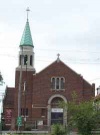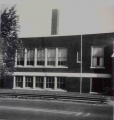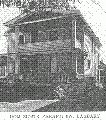|
| |||||
St. Barbara Church
From Brooklyn Centre Wiki
(Difference between revisions)
(→School) |
(→Organizations) |
||
| Line 75: | Line 75: | ||
===Organizations=== | ===Organizations=== | ||
| - | :Some of the male parishioners organized as the '''Brooklyn American Polish Civic Club'''. Later this club evolved into the Merrymen's Club | + | :Some of the male parishioners organized as the '''Brooklyn American Polish Civic Club'''. Later this club evolved into the St. Joseph Lodge and the Merrymen's Club. Meetings were held in the large brick two story house on the northeast corner of West 14th and Denison Ave. |
:*1964 | :*1964 | ||
| Line 84: | Line 84: | ||
::President -- William Yuschik | ::President -- William Yuschik | ||
::Treasurer -- Walter Dziedzina | ::Treasurer -- Walter Dziedzina | ||
| - | |||
===Transition=== | ===Transition=== | ||
Revision as of 17:49, 15 April 2007
| Address: | St. Barbara Church 1505 Denison Avenue Cleveland, Ohio |
| Affiliation: | Roman Catholic |
| Organized: | 1905 |
| Pastor: | Fr. Michael Dietz |
| Neighborhood: | West 15th St and Denison Avenue area |
Contents |
History
- St. Barbara's, a Roman Catholic Church, was first organized in 1906 on Valley Road.
- The location made it difficult for parishioners from around Denison Avenue to attend, especially during the winter and when the dirt road was wet and muddy.
- When the church burnt down in 1913, some parishioners were eager to have the church rebuilt elsewhere, preferably on Denison.
- In 1916, Bishop John P. Ferrelly purchased six lots from Caroline Loomis. The lots, part of the Petty and Baldwin Allotment, were all facing on Denison Avenue.
"In the Polish parish of St. Barbara, Father Joseph S. Jarosz broke ground on Denison Avenue at West 15th Street in July, 1950, for the construction of a new brick church in the Lombard round-arch style, capable of seating 650 people. Distinctive of the attractive structure is a 65-foot tower and the stained glass windows dipicting the seven sacraments. Archbishop Hoban dedicated it July 13, 1952"
--Source: "History of the DIOCESE OF CLEVELAND", page 422
- This Polish parish was known as Barbarowa, pronounced using a "V" in place of the "W", thus "Barba-roVa".
School
- The elementary school of St. Barbara's served the Polish community by providing education for children from Kindergarten thru 8th grade.
- See the St. Barbara Photo Album for class pictures.
- The main entry way was in the center of the building and led up to the upper floor. There were also doors on the east and west sides of the building that allowed easy exit from the lower floor. There may also have been an exit on the south side of the school that led to the playground, but I don't recall ever using it so it may have been blocked off by the 1950's.
- The upper floor had four classrooms with some grades doubling up when the class sizes were too small to warrant their own room. Also on this floor was the Principal's office and the nurse's room.
- The lower floor not only had two classrooms, but also the lavatories, boiler room, and the church. Later, after the church was moved to it's new building on the corner of West 15th and Denison Ave., the church area was turned into a gym where the children could exercise, have lunch, and watch movies.
- Each classroom had what was referred to as a "cloak room" where students could hang up their coats on hooks that ran along the wall. There was no such thing as individual lockers. The cloak room typically ran along the width of the room and had an entrance at each end.
- The Sisters of Saint Joseph order served as teaching staff at the school. The nuns lived in the convent house located behind the school building. The convent was originally a wood frame house. Later it was moved to Botany Ave near West 14th St. and a new brick convent was constructed on the old lot on West 16th St.
Organizations
- Some of the male parishioners organized as the Brooklyn American Polish Civic Club. Later this club evolved into the St. Joseph Lodge and the Merrymen's Club. Meetings were held in the large brick two story house on the northeast corner of West 14th and Denison Ave.
- 1964
- President -- Frank Franks
- Secretary -- Walter Dziedzina
- 1965
- President -- William Yuschik
- Treasurer -- Walter Dziedzina
Transition
- In the early 1960's, word came down from Cuyahoga County officials that a proposed highway would bisect the neighborhood. This was bad news for the people who had bought their homes and planned to live the rest of their lives there. A study of deed transfers shows that a small number of speculators jumped in and bought some properties. They probably knew what sort of price the State of Ohio Dept. of Transporatation was paying for properties acquired for freeways and paid the frantic sellers a lower price, hoping to make a profit from the true value. On the flip side of the coin, the sellers may have wanted to move quickly instead of waiting for the slow wheels of government to move, so jumped at the chance to be out of their property.
- After all the property was bought up on the east side of W.15th, the west side of W.14th and the north side of Redman, bulldozers moved in to begin demolition. It was an odd sight to be able to see straight across from the houses that were left on the eastern portion over to the houses that were on the western side.
Additonal Readings
- Miller, Carol Poh, 1950-
- Barbarowa: cultural resource report on a neighborhood of Cleveland. [1993]
- F499.C66 B376 1993a
- Miller, Carol Poh, 1950-
- Mihal, John
- "The Poles." Cleveland News, Jan. 11, 1941.
- "Polish community nestles in 'forgotten' corner of city.", . Harvard-Denison Bridge area Poles of Cleveland.
- Wang, Charissa Y. (editor)
- A history of the Barbarowa Neighborhood, Cleveland, Ohio
- submitted by Hardlines: Design & Delineation ; submitted to
- Burgess and Niple, Limited ; contributors, Roy A. Hampton
- III, historian.
- Barbarowa Neighborhood, Cleveland, Ohio
- Columbus, Ohio : Hardlines, [1999]
- Item Description: 77 p. : ill., maps ; 28 cm.
- F499.C66 B37 1999
Other Polish settlements in Cleveland were:
- Kantowa (University Hts, also known as the Tremont area)
- -- See the Tremont webpage by Pat Schmidt --
- Krakowa (Lansing Ave. and East 71st)
- Jackowa
- Josephatowa (East 33rd and St. Clair)
- Poznan (near East 79th and St. Clair Ave.)
- Warszawa (East 65th near Fleet Ave.)







